1 Kapitel 10.1: Relative Clauses
10.1: Relative Clauses
Ex. A: Nicos Weg. Episode 33: Essen gehen. Gucken Sie die Episode und beantworten Sie die Online-Fragen.
https://learngerman.dw.com/en/essen-gehen/l-38211308
der Relativsatz = relative clause
What in the world is a relative clause?!!! Here are a few examples in English:
- That’s the man who stole my car.
- Did you find the book that I lost?
- Call the student to whom you gave the book/who you gave the book to.
- We met a lady whose husband works at Aldi.
The relative clauses above are underlined. They do two things:
- They add more information to the main sentence.
- They can’t stand by themselves as a complete sentence; they must have the main sentence to help them out. (Beispiel: “that I lost.” Sounds odd by itself.)
Relative clauses often combine two simple sentences together to make one longer sentence.
- That is the man.
- He stole my car.
We combine together to get a longer sentence:
- “That is the man who stole my car.”
In a nutshell, it makes your speech sound more advanced and natural.

German works the same way as English to form relative clauses.
- Das ist der Mann, der mein Auto gestohlen hat.
- Hast du das Buch gefunden, das ich verloren habe?
- Ruf den Studenten an, dem du das Buch geschenkt hast.
- Wir haben eine Frau kennengelernt, deren Mann bei Aldi arbeitet.
However, there are a few differences:
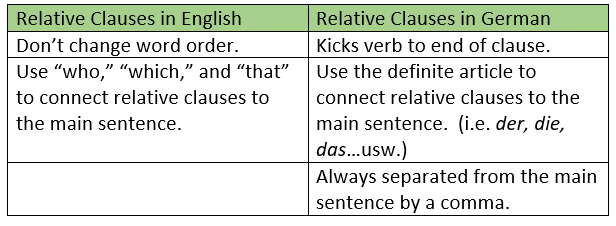
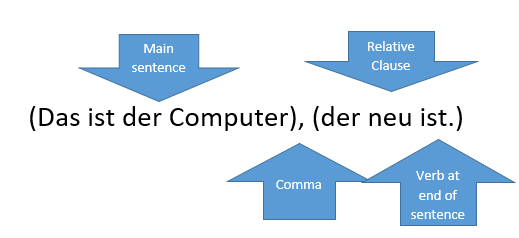
By the way, it will absolutely be worth watching Easy German’s video to do a review of all four cases in German: nominative, accusative, dative, and genitive. You will use all four of them when doing relative clauses:
Relativsätze im Nominativ:
First of all, remember that the nominative case refers to the subject of the sentence—the person or thing DOING the action. You can review the nominative case here:
https://una.pressbooks.pub/gr101/chapter/section-1-12/
Masculine:
That is the man.
Das ist der Mann.
The man stole my bicycle.
Der Mann hat mein Fahrrad gestohlen.
If I want to combine together these two sentences, they can connect where they share a word: der Mann.
HOWEVER, where I would normally write “der Mann” in the clause, we will replace it with only the definite article→der.
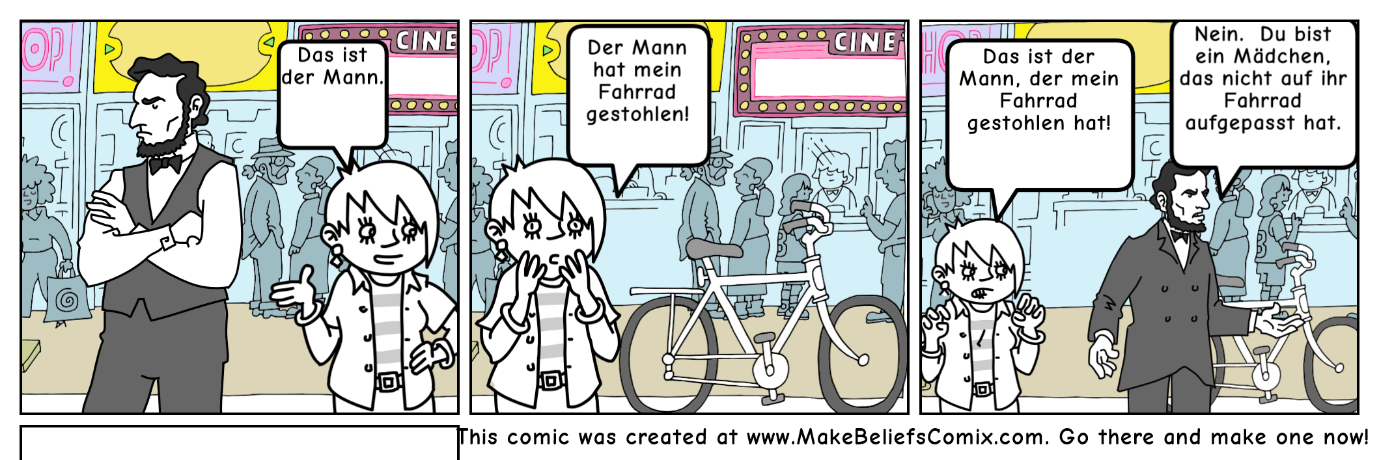
Das ist der Mann, der mein Fahrrad gestohlen hat.
- We connected the sentences with „der“ from „der Mann.”
- We kicked the first verb to the end. (Normally, it would have read, “Der Mann hat mein Fahrrad gestohlen.”)
Feminine:
Do you see the woman?
Siehst du die Frau?
She lives on Goethe Street.
Sie wohnt in der Goethestraße.
(„She“ and „the woman“ are the same person. We connect the sentences here.)

Siehst du die Frau, die in der Goethestraße wohnt?
- We connected the sentences with „die” from “die Frau.”
- We kicked the verb to the end of the clause.
Neuter:
Buy the book.
Kauf das Buch.
The book has a better price.
Das Buch hat einen besseren Preis.
(Both sentences share the word „Buch.”)

Kauf das Buch, das einen besseren Preis hat.
- We connected the sentences with „das” from “das Buch.”
- We kicked the verb to the end of the clause.
Plural:
Those are the children.
Das sind die Kinder.
They always come by.
Sie kommen immer vorbei.
(“Die Kinder” and “sie” are the same thing, so we connect the two sentences here.)

Das sind die Kinder, die immer vorbeikommen.
- We connected them with „die” from “die Kinder.”
- We kicked the verb to the end.
Relative Pronoun: the der, die, or das that connects the relative clause to the main sentence.

We translate these into English as “that,” “which,” or “who.” When translating from German into English, just pick the one that sounds best for English.
Relative clauses don’t always have to go at the end of the sentence. They can also be in the middle.

The man who is eating the hamburger is my neighbor.
Der Mann, der den Hamburger isst, ist mein Nachbar.
In any case, no matter where the relative clause ends up, the following always apply.
- Separated from main sentence by a comma
- Verb is kicked to end of clause.
Watch YourGermanTeacher’s video to see more on using relative clauses in the nominative case:
Ex. B: Auf Englisch! Übersetzen Sie die folgenden Relativsätze ins Englische.
- Das ist die Studentin, die beim Dönerrestaurant arbeitet.
- Das ist das Hemd, das zu klein ist.
- Kennst du den Mann, der mit unserem Professor spricht?
- Wo sind die Studenten, die uns helfen wollten?
- Wir möchten in einem Restaurant essen, das nicht zu teuer ist.
- Ihr habt keine Freunde, die im Ausland studieren.
- Die Touristen, die vor dem Bahnhof stehen, sind gerade vom Supermarkt gekommen.
- Wie heißt der Professor, der Spanisch 101 lehrt?
- Das Buch, das auf dem Tisch liegt, finde ich super langweilig.
- Die Nudeln, die man bei Pho 89 bestellen kann, schmecken sehr gut, wenn es draußen kalt ist.
Ex. D: Nominativ. Bilden Sie einen längeren Satz!![]()
- Ich möchte eine Pizza bestellen. Die Pizza ist vegetarisch.
- Stephan trägt eine kurze Hose. Sie ist zu kurz.
- Ted hat eine Katze. Sie miaut jeden Tag.
- Alabama hat einen Fluss. Der Fluss heißt „Tennessee River.“
- Xander hat einen Mitbewohner. Der Mitbewohner schnarcht zu laut.
- Gib mir das Buch. Es liegt auf dem großen Schreibtisch.
- Putz das Haus. Es steht in der Gottfriedstraße.
- Häng das Bild auf. Es ist heruntergefallen.
- Gutenberg hat die Druckerpresse erfunden. Sie konnte Bücher viel schneller drucken.
- Ich möchte mit der Kreditkarte zahlen. Sie steckt in meiner Tasche.
Ex. E: Auf Deutsch! Übersetzen Sie ins Deutsche.
- I want a jacket that isn’t old-fashioned.

- That’s the man who likes to jog every morning.
- We need a plan that works.
- She owns a horse that has only three legs.
- They live in a land that has a mountain range.
- I’d like to get to know the new student who came by today.
- That’s a mirror that is broken.
- Do you have a vacuum cleaner that works?
- We recommend a hotel that is calm/peaceful.
- I’m afraid of thieves who will steal my credit card.
Ex. F: Nicos Weg. Episode 34: Die Karte bitte! Schauen Sie sich die Episode an und machen Sie die Online-Übungen. You will review relative clauses in the nominative case.
https://learngerman.dw.com/en/die-karte-bitte/l-38211417
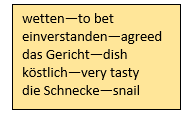
EXTRA PRACTICE: Go to Germanzone.org’s site to do extra practice with relative clauses in the nominative case. As always, the site will grade your answers.
https://www.germanzone.org/relative-pronouns-clauses-1/
Ex. G: Nicos Weg. Episode 35: Was darf es sein? Gucken sie das Video und beantworten Sie die Online-Fragen.
https://learngerman.dw.com/en/was-darf-es-sein/l-38217319
Ex. H: Im Restaurant. Sie sind im Restaurant. Leider gibt es ein Problem mit Ihrem Essen. Beschreiben Sie dem Kellner das Problem.
Tipps: https://learngerman.dw.com/en/commenting-on-your-food/l-38217319/e-38224330.
Listen to Santiano’s song, Alle die mit uns auf Kaperfahrt fahren, to hear examples of relative clauses (plural).
Text: https://www.songtexte.com/songtext/santiano/alle-die-mit-uns-auf-kaperfahrt-fahren-4b852316.html
Relativsätze im Akkusativ:
Sometimes, the connecting word in the clause is in the accusative case. When that happens, we use the definite article in the accusative case.


Frage: Was ist der Akkusativ nochmal?
Antwort: das Objekt
Beispiele:
- Ich habe gestern dieses T-shirt gekauft.
- Du liest den neuen Roman.
- Er bucht einen Flug nach Rom.
(You can review the accusative case here:)
https://una.pressbooks.pub/gr101/chapter/section-2-3/
We can also connect the sentences at the direct object.
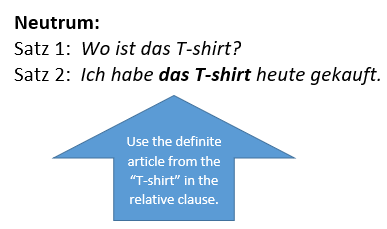
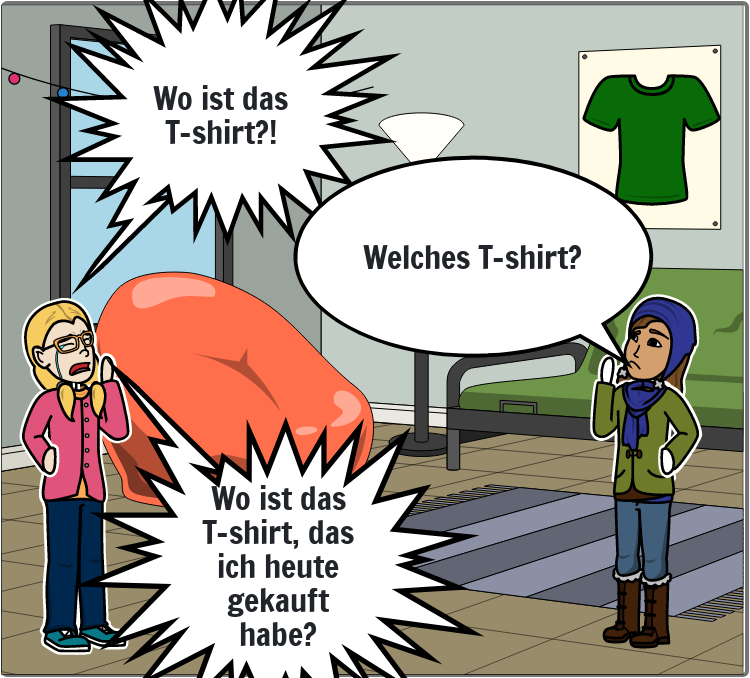
(Both have the word T-shirt in common; connect them here.)
(Use the “das” from the relative clause.)
Wo ist das T-shirt, das ich heute gekauft habe?
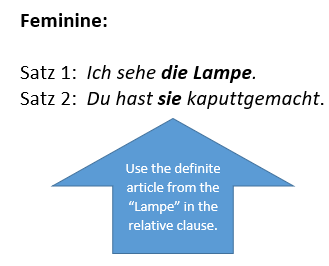

(Both have the word Lampe in common; connect them here.)
(Use the “die” from the relative clause.)
Ich sehe die Lampe, die du kaputtgemacht hast.

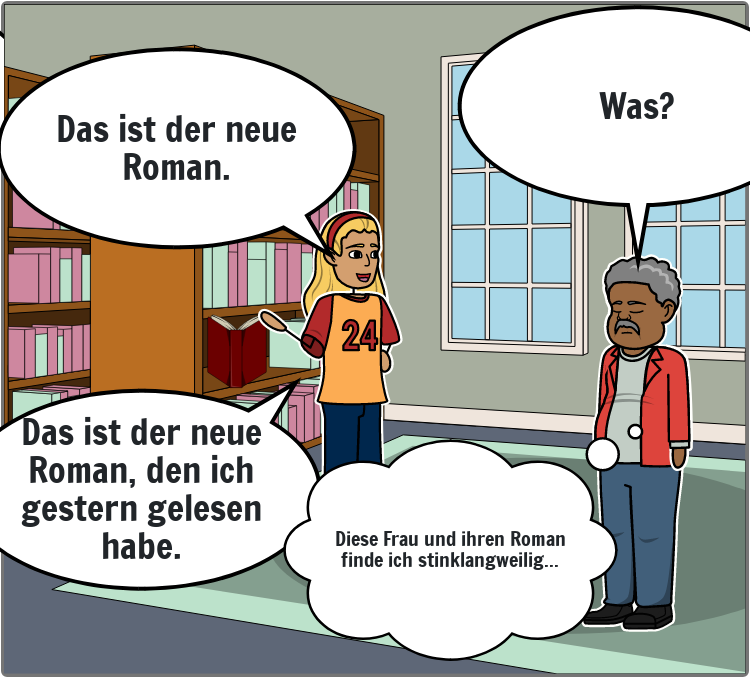
Das ist der neue Roman, den ich gestern gelesen habe.
Common Question of Panicking Students:

But HOW DO I KNOW if it’s der or den?!!!!
- Look at the relative clause.
- Put a blank where the der or den should go.
- Then determine whether the blank is the subject (the person or thing doing the action) OR the object (the thing being done.)
- Subject = nominative aka der
- Object = accusative aka den


(Connect with „die“ from „die Kinder.“)
Ich kümmere mich um die Kinder, die du abgeholt hast.
Watch YourGermanTeacher’s video to see more on using relative pronouns in the accusative case:
QUICK LISTENING PRACTICE: Listen to Johanna, AudioLingua, describe her shopping trip. You will hear several relative clauses, clothing items, and adjective endings.
Ex. K: Längere Sätze. Machen Sie aus den zwei Sätzen einen längeren Satz.
- Wir sprechen über die Kleidung. Du hast sie gekauft.
- Ich melde mich für einen Wirtschaftskurs an. Er fängt nächstes Semester an.
- Alle Studenten freuen sich auf eine Reise. Sie machen eine Reise nach Frankreich.
- Mein Bruder bewirbt sich bei einer Firma. Sie befindet sich in Europa.
- Erinnerst du dich an den Film? Wir haben ihn gestern Abend gesehen.
- Kümmere dich um die Hausaufgaben. Wir müssen sie vor Freitag erledigen.
- Die neue Angestellte stellt sich immer so an. Sie hat gerade angefangen zu arbeiten.
- Ich habe Angst vor dem Mann. Ich habe ihn gestern beleidigt.
- Friederike hat sich in ihren Nachbarn verliebt. Er arbeitet als Spion.
- Ich bitte um einen Schreibtisch. Er ist nicht kaputt.
Ex. L: Auf Deutsch! Übersetzen Sie ins Deutsche.
- Bring me the novel that we’re reading in literature.
- Where does the lady live who called us today?
- The supermarket that sells Nutella is open from eight to twelve.
- I’m applying for a job at the library that is next to the university.
- The baker is happy about the new apprentice who showed up for work on time.
- Repair the door that you broke!
- Sell the machine that doesn’t work anymore.
- We found a new stovetop that we want to buy.
- The handyman cleaned the basement that flooded.
- We are moving into the apartment that they renovated.
EXTRA PRACTICE: (Courtesy of Claudia Kost & Crystal Sawatzky, University of Alberta.)
Ex. M: Nicos Weg. Episode 36: Ich bin Koch. Gucken Sie die Episode und machen Sie die Online-Übungen. (You will review relative clauses in the nominative AND accusative cases.)
https://learngerman.dw.com/en/ich-bin-koch/l-38214462
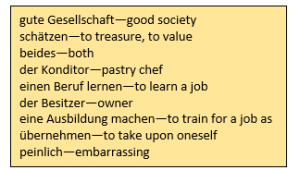
Ex. N: Rollenspiel. Sie sind im Restaurant und möchten zahlen.
Tipp: https://learngerman.dw.com/en/keep-the-change/l-38214462/e-38215983
Ex. O: Nicos Weg. Episode 37: Bei uns oder bei euch? Gucken Sie die Episode und beantworten Sie die Online-Fragen. (You will learn several idiomatic German expressions and review separable prefix verbs and dative pronouns, which you learned in Kapitel 4.)
https://learngerman.dw.com/en/bei-uns-oder-bei-euch/l-38209600

Ex. P: Nicos Weg. Episode 38: Ich bin neu hier. Gucken Sie die Episode und beantworten Sie die Fragen.
https://learngerman.dw.com/en/ich-bin-neu-hier/l-38213511
![]()
Ex. Q: Freunde. Wie haben Sie Ihre Freunde kennengelernt? Beschreiben Sie alles ganz genau!
QUICK LISTENING: Listen to Luisa‘s (AudioLingua) description of the German city Halle. Why is it famous?
Relativsätze im Dativ:
Now we move on to relative clauses in the dative case.

Häufige Frage: Wait…what’s the dative case again?
Antwort: It’s used for indirect objects, after dative prepositions, and after dative verbs. You can review it in Chapter 4→ https://una.pressbooks.pub/german-102/chapter/section-4-4/
Dative Case Examples:
- After direct object: Zeig deiner Großmutter das Foto von unserem neuen Auto.
- After dative preposition: Kirsten wohnt bei ihrem Bruder.
- After dative verb: Welche Firma gehört unseren Freunden?
We also have relative clauses that use the same dative definite articles…with ONE EXCEPTION*:
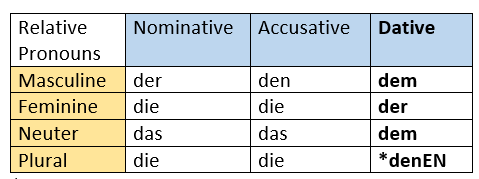
*Normally, the dative case definite article for plural is den. However, when you use it in a relative clause, it lengthens out to denen. Warum? Das ist Deutsch!
Masculine:
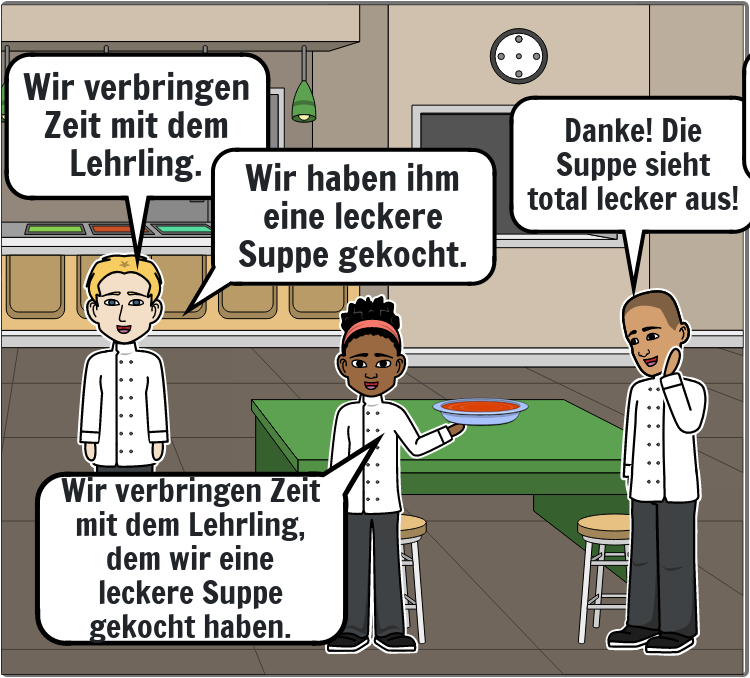
Satz 1: Wir verbringen Zeit mit dem Lehrling.
Satz 2: Wir haben ihm ein leckeres Mittagessen gekocht.
(Both share the word „Lehrling,” so we connect them there.)
Wir verbringen Zeit mit dem Lehrling, dem wir ein leckeres Mittagessen gekocht haben.
Feminine: ![]()
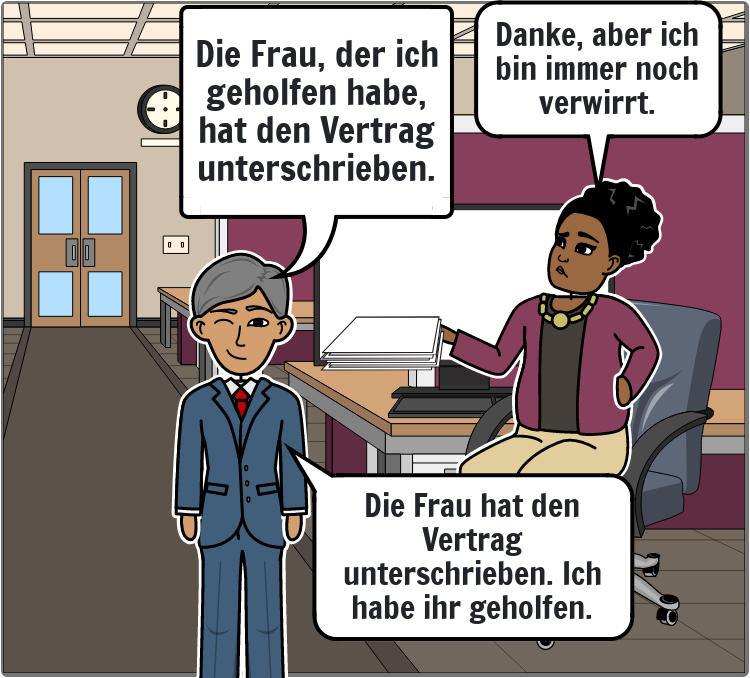
Satz 1: Die Frau unterschrieb den Vertrag.
Satz 2: Wir haben ihr geholfen.
(By the way, helfen is a dative verb.)
(Both sentences share the word “Frau,” so we connect them there.)
Die Frau, der wir geholfen haben, unterschrieb den Vertrag.
Neutrum:

Satz 1: Ihr sollt das Zimmer aufräumen.
Satz 2: Ihr werdet im Herbst in dem Zimmer wohnen.
(Remember…”in” is a two-way preposition that goes dative in this example because it shows no motion.)
(Both share the word “Zimmer,” so we connect them here.)
Ihr sollt das Zimmer aufräumen, in dem ihr im Herbst wohnen werdet.
Plural: ![]()
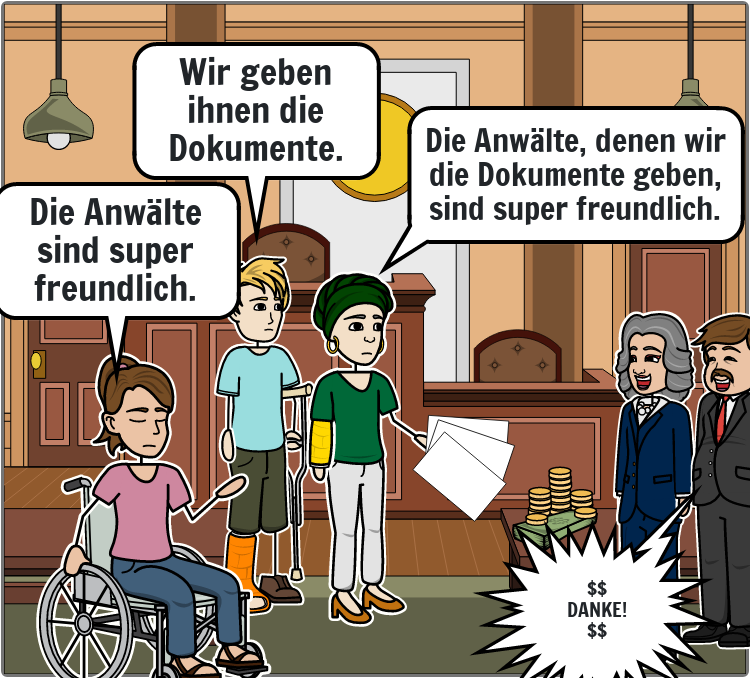
Satz 1: Die Anwälte sind super freundlich.
Satz 2: Wir geben den Anwälten die Dokumente.
(Both share „Anwälte,“ so we connect them here.)
Die Anwälte, denen wir die Dokumente geben, sind super freundlich.

WATCH OUT!!!! Normally, the definite article for dative plural is den, BUT when using it as a relative pronoun, it lengthens to denen.
Watch YourGermanTeacher’s video to see more on using relative pronouns in the dative case:
Watch Learn German Fast’s video to see a review of relative pronouns in the nominative, accusative, and dative.
QUICK LISTENING PRACTICE: Listen to Therese (AudioLingua) talk about her home city, Tübingen. You will hear two relative clauses.
Ex. S: Längere Sätze. Machen Sie aus den zwei Sätzen einen längeren Satz.
- Der Tourist wollte sofort in sein Zimmer gehen und schlafen. Die Hotelangestellte hat ihm eine Schlüsselkarte gegeben.
- Da sitzt die Frau. Wir sollten ihr für die nette Karte danken.
- Wie heißt der Azubi? Du hast ihm geholfen.
- Die Frau zahlt mit Kreditkarte. Der Hotelmanager hat gestern von ihr gesprochen.
- Das Einzelzimmer hat viele Ratten! Ich übernachte im Zimmer.
- Das Taxi stammte aus der ehemaligen DDR. Wir fuhren damit.
- Mein Onkel isst leider nur vegane Schokolade. Wir gaben ihm zu Weihnachten eine Tafel Vollmilchschokolade.
- Die Bankangestellten warten auf den Feierabend. Der Chef hat sich von ihnen verabschiedet.
Ex. U: Nicos Weg. Episode 39: Mein Traumpartner. Gucken Sie die Episode und beantworten Sie die Online-Fragen. Sie werden das Perfekt (Kapitel 5) wiederholen.
https://learngerman.dw.com/en/mein-traumpartner/l-38218883

Ex. V: Nicos Weg. Episode 40: Alte und neue Freunde. Schauen Sie sich die Episode an und machen Sie die Online-übungen. Sie wiederholen die Personalpronomen im Dativ, die Sie im Kapitel 4 gelernt haben.
https://learngerman.dw.com/en/alte-und-neue-freunde/l-38219715

WIEDERHOLUNG: Listen to Julia, AudioLingua, describe her band and its members. You will hear several relative clauses. After each sentence with a relative clause, pause the audio and discuss which word it is modifying and which case the relative pronoun is in.
Relativsätze im Genitiv:
Finally, we can also have relative clauses in genitive. The easy way to connect these instantly to English is to remember that they translate to “whose.”![]()
- Die Frau, deren Mann ihr einen Blumenstrauß geschenkt hat, freut sich sehr.
(The woman whose husband gave her a bouquet is very happy.)
- Der Chef interessiert sich für den Kunden, dessen Hund die Kekse gefressen hat.
(The boss is interested in the customer whose dog ate the cookies.)
The relative pronouns look just like the definite articles with a little extra added to the end.
*Denotes those with an extra part added to the end.

Masculine:

Satz 1: Die Firma hat einen neuen Arbeiter angestellt.
Satz 2: Sein Auto ist ein Oldtimer.
Die Firma hat einen neuen Arbeiter angestellt, dessen Auto ein Oldtimer ist.
Feminine:
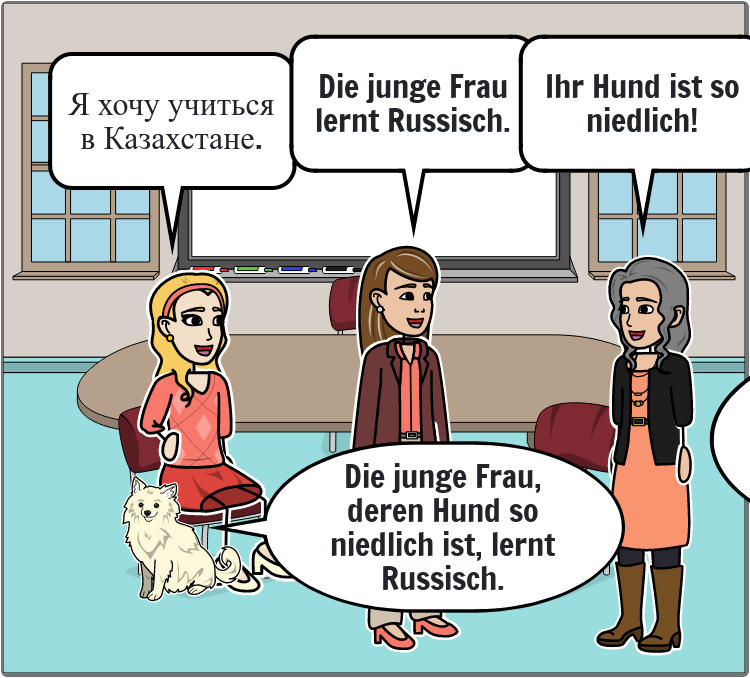
Satz 1: Die junge Frau lernt Russisch.
Satz 2: Ihr Hund ist so niedlich.
Die junge Frau, deren Hund so niedlich ist, lernt Russisch.
Neuter:

Satz 1: Das Mädchen möchte sich zu den Frauen setzen.
Satz 2: Ihre Katze hatte eine Maus gefangen.
Das Mädchen, dessen Katze eine Maus gefangen hatte, möchte sich zu den Frauen setzen.
Plural:

Satz 1: Ich kaufe die Schuhe.
Satz 2: Ihr Preis ist günstiger.
Ich kaufe die Schuhe, deren Preis günstiger ist.
Watch Learn German Fast’s video to see a review of relative clauses in genitive:
Ex. X: Relativsätze im Genitiv. Machen Sie einen längeren Satz.
- Denkt an eure Mutter! Ihr Leben war viel schöner, weil ihr geboren seid!
- *Mein Mitbewohner sagt, sein Hund stört niemand. Sein Hund schnarcht immer so laut.
- Das Land hatte leider viele Probleme. Sein Präsident starb im Amt.
- Die Kinder wollten einen Hund. Sein Fell war schwarz und weiß wie die Hunde im Film 101 Dalmatiner.
- Viele Leute essen täglich das deutsche Brot. Sein Rezept enthält viele Vitamine, die der menschliche Körper braucht.
- Der Untergang der Titanic passierte am 15. April. Ihre Geschichte kommt immer wieder in Dokumentarfilmen vor.
- Der Student musste sofort zum Zahnarzt. Sein Zahn ist abgebrochen.
Ex. Y: Nicos Weg. Episode 41: Stadt oder Land? Schauen Sie sich die Episode an und beantworten Sie die Online-Fragen. Sie werden
https://learngerman.dw.com/en/stadt-oder-land/l-38211402
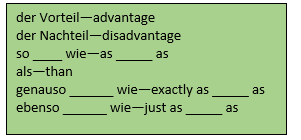
Ex. Z: Das Großstadtleben oder ein Landleben? Vergleichen Sie das Leben in der Stadt mit dem Leben auf dem Land. Welche Vorteile und Nachteile gibt es? Wo würden Sie lieber wohnen? Warum? (Beispiel: Esther, AudioLingua, erzählt von ihrem Leben in einem kleinen Dorf.)
Watch Easy German’s video on Relativsätze to learn how to make longer sentences:
Watch Karina Multilingual’s video to see a review of all four cases with relative clauses in German with lots of examples:
EXTRA PRACTICE: Go to Germanzone.org’s website to do extra practice with relative clauses with all four cases.
https://www.germanzone.org/relative-pronouns-clauses-1/
Here are several other extra practice exercises with relative clauses. The site will grade your answers and give you feedback. (Yes, I realize there are a lot of these, but this can be a complex grammar topic, and it helps to do LOTS of extra practice.)
- https://www.deutsch-perfekt.com/deutsch-ueben/relativsaetze
- https://mein-deutschbuch.de/grammatikuebungen-relativsaetze.html
- https://deutsch.lingolia.com/de/grammatik/satzbau/relativsaetze/uebungen
- https://www.grammatikdeutsch.de/html/relativsatze-1.html
- https://www.germancenter-st.com/de/deutsch-online-uebungen/grammatik/177-relativsaetze-auf-deutsch
- https://language-easy.org/de/grammatik/relativsaetze-uebungen/
- http://lerngrammatik.de/uebung_satz_relativsatz_1.htm
- https://www.schubert-verlag.de/aufgaben/xg/xg09_04.htm

